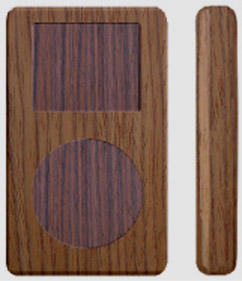 Planning a trip to Europe, I started a list of items to pack. The first handful is digital in nature:
Planning a trip to Europe, I started a list of items to pack. The first handful is digital in nature: • A digital camera (which comes with an extra battery pack and memory chip and a plug-in charger),
• An iBook (with its cord, plug, USB mouse, and protective case),
• An iPod (with its cord, earbuds, docking plug, and cute knit sock),
• A cellphone (with two forms of charger), and
• A minidisk recorder (with a microphone, extra MDs, cord, plug, VoIP adaptor, iMic adaptor, and headphones), plus
• European power adaptors for 'em all.
I picture myself, like a new father, tottering toward the departure gate with my luggage and a baby bag in tow filled with all the accessories I'll need should I wish to call/charge/upload/email or otherwise put a layer of interface between me and the world I'm experiencing.
Given the excessiveness of it all, maybe there's one more device I need: a piiPod. Designed by the Dutch sculptor Pii, the piiPod is the size, shape, and feel of Apple's famous mp3 player, only it's constructed of hardwood and is "specially designed to be unable to play music and sound files." The piece is on view September 1–17, along with Pii's installation of 12 bronze laptops filled with genetically modified rice and corn, at London's Spectrum Fine Art.
While the wood iPod might be a symbol of my willing (and blissful) enslavement to mediating technologies, Pii has another message, it seems. He says:
I am trying to make people think about what they are missing out on by spending their free lives and transportation periods—travel—locked into their own musical worlds. People do become addicted and dependent—whether there are really health problems or not. It is a basic part of treatment for any serious addiction to attempt to provide a substitute of some kind.And his grain-filled notebook computers critique the position many westerners take on genetically modified grains: putting grain inside a symbol of our luxury "reminds people of our good fortune to be able to make judgments and have debate on a full tummy"—while we type away on our laptops, pondering the long-term safety of GMOs, people are starving.
To digress a bit: I find his argument simplistic. We already produce enough grain to feed the world without the yield-enhancing boost of genetic engineering; transport is the problem. Further, as a recent report by Third World Network-Africa found, "The answer to Africa’s poverty and food shortage problems does not lie in biotechnology. GM crops do not offer any answers to soil fertility, resistance to genes by pests among other problems faced by the farmers of the three crops. It also clear that biotechnology is not the answer to corruption, declining commodity prices, inequality in land distribution and ownership, income disparities, and armed conflicts which are some of the major cause of poverty/hunger in Africa." (And don't get me started on who really benefits from GMOs.)

But Pii seems to admit that the point of his sculptures is to spark dialogue on these issues, and that's something I can agree with. He says:
I admire the Apple design, but I also find it wonderful that we have a piece of technology here that is also named after a source of physical sustenance and food—while we use Apple computers in the west, people elsewhere have no fruit to survive. This is not the fault of Apple Computers, but should certainly encourage people to think.[Cross-posted at Off-Center.]
No comments:
Post a Comment